- Home
- Laura Thalassa
War (The Four Horsemen Book 2)
War (The Four Horsemen Book 2) Read online
Contents
Chapter 1
Chapter 2
Chapter 3
Chapter 4
Chapter 5
Chapter 6
Chapter 7
Chapter 8
Chapter 9
Chapter 10
Chapter 11
Chapter 12
Chapter 13
Chapter 14
Chapter 15
Chapter 16
Chapter 17
Chapter 18
Chapter 19
Chapter 20
Chapter 21
Chapter 22
Chapter 23
Chapter 24
Chapter 25
Chapter 26
Chapter 27
Chapter 28
Chapter 29
Chapter 30
Chapter 31
Chapter 32
Chapter 33
Chapter 34
Chapter 35
Chapter 36
Chapter 37
Chapter 38
Chapter 39
Chapter 40
Chapter 41
Chapter 42
Chapter 43
Chapter 44
Chapter 45
Chapter 46
Chapter 47
Chapter 48
Chapter 49
Chapter 50
Chapter 51
Chapter 52
Chapter 53
Chapter 54
Chapter 55
Chapter 56
Chapter 57
Chapter 58
Chapter 59
Chapter 60
Chapter 61
Chapter 62
Chapter 63
Epilogue
Author’s Note
This is a work of fiction. References to real people, events, establishments, organizations, or locales are intended only to provide authenticity, and are used fictitiously. All other characters, and all incidents and dialogue, are drawn from the author’s imagination and are not to be construed as real.
Published in the United States by Lavabrook Publishing, LLC.
war. Copyright © 2019 by Laura Thalassa
www.laurathalassa.com
Cover by Regina Wamba
www.maeidesign.com
All rights reserved.
In loving memory of Robert H.
Forever your “little sister.”
When He broke the second seal, I heard the second living creature saying, “Come.” And another, a red horse, went out; and to him who sat on it, it was granted to take peace from the earth, and that men would slay one another; and a great sword was given to him.
—Revelation 6:3-4 NASB
Cry ‘Havoc,’ and let slip the dogs of war;
That this foul deed shall smell above the earth
With carrion men, groaning for burial.
—Shakespeare
Chapter 1
Year 13 of the Horsemen
Jerusalem, New Palestine
The day starts off like most others. With a nightmare.
The explosion roars through my ears, the force of it knocking me into the water.
Darkness. Nothing. Then—
I gasp in a breath. There’s water and fire and … and … and God the pain—the pain, the pain, the pain. The sharp bite of it nearly steals my breath.
“Mom, Mom, Mom!”
Can’t see her. Can’t see anyone.
“Mom!”
The sky bobs above me. I cough in the smoke. My bag is wrapped around my ankle and it’s dragging me down, down, down.
No. I try to kick my way back up to the surface, but despite my efforts it moves farther and farther from reach.
My lungs pound. The sunlight above me grows dim even as I struggle.
I open my mouth to cry for help.
The water rushes in—
I sit up in bed with a gasp.
I can hear my wall clock clicking away, the pendulum swinging back and forth, back and forth.
I touch the scar at the base of my throat as I steady my breathing. My sheets are twisted around my ankles. I disentangle myself and roll out of bed.
Grabbing a nearby box of matches, I light an oil lamp. Briefly, it illuminates a picture of my family before I raise it high enough to see the time on the clock.
3:18 AM.
Ugh. I rub my face.
I set the lamp down on my workbench, shoving aside the feathers, glass arrowheads, and scraps of plastic that litter its surface.
I glance longingly at my bed. There’s no way I’m falling back asleep, which means I can work on my latest commission or I can go scavenging. I glance at the walls, where some of my finished products hang—the oiled bows and painted arrows barely visible in the darkness.
Salvage-chic weaponry sells for a pretty penny these days.
It’s too dark to make out the photos hanging alongside them, but my throat tightens at the thought of the images anyway.
Right now, on the wings of my dream, I don’t want to keep company with the memories that haunt my flat.
So scavenging it is.
My boots crunch along loose gravel as I wind my way through the streets of Jerusalem, outfitted with my bow, quiver, and the canvas bag I’ll use to store my finds. I have a dagger at my hip and a small axe in my bag.
I pass by a darkened mosque, which will be filled with people by the time I return. The synagogue down the street is dark and ominous, several of its windows boarded up. It looks meek and repentant, like it didn’t once proudly own that space.
No one else is out, save for the occasional Palestinian guard. They eye me grimly but leave me alone.
Life wasn’t always this way.
I can vaguely remember my childhood. I had a happy one—or rather, I used to lack worries, and that’s almost the same thing. Now, worries stack like stones on my shoulders.
But that life is less real to me than even the dream I woke to.
I touch the hamsa charm on my wrist as I glance around me. The moment I get a little too comfortable with my surroundings is the moment I get attacked.
No, life wasn’t always this way, but this has been my reality ever since the Horsemen arrived.
I can see Day One in my mind’s eye like it’s happening all over again.
How the lights in my fourth grade classroom popped as they burned out, one after the other. My ears still ring from the sounds of my classmates’ screaming.
I had the misfortune of sitting near a window, so I saw firsthand how the cars lost power, their metal bodies crashing into whatever—or whoever—was nearest them.
I saw a woman mowed down by a car, her eyes wide for that single second before impact. Sometimes, when I remember it, it’s my father I see and not the woman.
I wonder sometimes, if that’s how it played out. I never saw his mangled body—I just heard that he’d been hit by a bus—so all that’s left is wonder.
People around here are fond of saying that life can change in an instant, and it’s true. Birth, death, four strange men showing up one day with plans to destroy the world—all instant life changes.
But sometimes, the most insidious change happens over time. Because Day One ended and Day Two began. We were all expected to just continue to exist even when cars couldn’t drive and phones couldn’t call, and computers couldn’t compute, and so many beloved lives were lost. Eventually this terrible new existence had to become normal. And that’s how life’s been for most of my twenty-two years.
I move west through the city, past an aviary, the birds inside quiet at this hour. Once, you could get news almost instantaneously. Now carrier pigeon is the fastest way of sending messages … and there’s no gua
rantee that an outgoing message will get where it needs to go on one try. Birds, after all, are only so obedient and intelligent.
The night is quiet. It’s been like this for the last month. Not that it’s ever particularly rowdy here at night, but this feels different. You can sense people’s worry in the still air.
It must be the rumors.
There were … strange stories from the east, stories meant to scare you when you’re huddled over a fire and the night seems especially terrifying.
Stories about entire cities going to the grave. About streets scattered with bones and cemeteries tilled like fields. And through it all, War, riding on his blood red steed, his sword brandished.
I don’t know how true they are—these days, so many things are hearsay—but Jerusalem has been more subdued than usual. A few people have even packed up and left.
I might’ve been one of those people, if I had enough money to get where I wanted to go. But I don’t, so Jerusalem it remains.
As I get close to the Judaean Mountains that lie on the outskirts of the city, I hear the echoing footfalls of someone walking behind me. Could be the Muslim Brotherhood, could be the Palestinian police force, it could be a raider like me or a prostitute looking to fill the last of her quota for the night.
It’s probably nothing. Still it doesn’t stop me from going over my survival code, otherwise known as Miriam Elmahdy’s Guide to Staying the Fuck Alive:
(1) Bend the rules—but don’t break them.
(2) Stick to the truth.
(3) Avoid notice.
(4) Listen to your instincts.
(5) Be brave.
Five simple rules that, while not always being easy to follow, have kept me alive for the last seven years.
I pick up my pace, hoping to put distance between me and the stranger. Less than a minute later, I hear the footsteps behind me quicken.
I sigh out a breath.
Sliding my bow off my shoulder, I remove an arrow from my quiver and nock it into place. Spinning around, I take aim at the dark shape.
“Move along,” I say.
The shadowy figure is maybe ten meters away. They raise their hands, stepping forward a little.
“I just wanted to know what a girl like you was doing out this late,” the man calls out.
So, the individual’s not a prostitute and probably not the police either. That leaves the Muslim Brotherhood, a local gang member, or an ordinary civilian willing to pay for a woman’s company. Of course, he could also be a fellow raider looking to poach my finds off of me.
“I’m not a prostitute,” I call out.
“I didn’t think you were.”
So, not a confused customer.
“If you’re with the Brotherhood,” I say, “I’ve paid my dues for the month.” It’s the cost of moving about the city with impunity.
“It’s alright,” the man says. “I’m not with the Brotherhood.”
A raider then?
He takes a step towards me. Then another.
I pull my bowstring back, the wood of my bow groaning.
“I’m not going to hurt you.” He says it so kindly that I want to believe him. But I’ve learned to trust what people do rather than what they say, and he’s not backing off.
A criminal then. Honest people don’t just sweet talk their way into getting closer unless they want something from you.
And whatever he wants, I doubt I’m going to like it.
“If you come any closer, I will shoot,” I warn.
His footfalls pause, and the two of us stand there for several seconds at an impasse.
He’s standing in the shadows between the gaslit streetlamps, so it’s hard to make out what he’s doing, but I think he’s going to leave. It would be the wise thing to do.
His footfalls resume—one, two, three—
I close my brown eyes briefly. This is no way to start a day.
The man begins to pick up his pace as he gains more confidence that I won’t shoot. He’s completely unaware that I’ve done this before.
Forgive me.
I release the arrow.
I don’t see quite where it lands in the darkness, but I do hear the man’s choked gasp, and then I see him collapse.
For several seconds I stay where I am. Only reluctantly do I lower my bow and walk over to him, a hand hovering near the dagger at my hip.
As I get close, I see my arrow protruding from the man’s throat, his blood darkening his skin and the ground beneath him. His breathing is wheezy and labored.
I stare at his face for several seconds as he grasps at the projectile. I don’t recognize him, not that I assumed I would. I guess that’s a relief. My eyes go to the bag he was carrying.
Crouching down, I open it up and rifle through his things. Rope, a crowbar, and a knife. A murder’s starter pack.
Unease skitters through me. Most people who do bad things have their motives—greed, power, lust, self-preservation. It’s unnerving to cross paths with someone who plans on hurting you not as a means to an end, but as the end itself.
The man’s choking breaths slow, then stop altogether, his chest going still.
Once I’m sure he’s gone, I remove my arrow from his body, wiping it off on his trousers before I slip it back into my quiver.
No one will bother to investigate what happened. No one will be punished, and by the time the sun is high in the sky, the body will be moved and the city will soon forget there was ever a corpse in the road to begin with.
Giving the man one final glance, I touch the hamsa on my bracelet and walk away.
I head out of the city and into the hills that lay to the west, trying not to think about the man I killed and what he wanted. Or that I barely paused before killing him.
I rub my forehead and then my mouth. Death is getting easier for me to dole out. That’s … worrisome.
Once I’ve made my way into the rolling mountains, I veer off the road and towards the trees. The sky is just starting to lighten, turning from navy to ash as the sun gets closer to the horizon. Farther up the hill I see the bones of a half-complete house, the cinderblock and corrugated iron frame only partially complete before its owner abandoned the project.
I move towards it, the shell of a house a familiar sight. But it’s not the building I was seeking so much as the trees around it.
Heading over to a pine tree, I pull out my axe and begin to chop away at a thick branch. The wood here makes for good bows and arrow shafts.
Fifteen minutes into my work I hear … something.
I pause, my eyes going to the road. I strain my ears, but the wooded hills are quiet—
Wait.
There it is again. The sound is barely audible. I can’t tell what it is, only that it’s steady.
Probably a traveler.
I move to the nearby house, quietly slipping inside. I’d rather not get into a skirmish twice in one night.
Inside the abandoned structure, dirt, old leaves, and several cigarette butts litter the ground. By the looks of the place, it was built after the Arrival—there are no electrical outlets, nor are there any pipes that might carry running water. Those luxuries we lost shortly after the horsemen came, and try as we might, we haven’t been able to get them back.
I move over to an open framed window, keeping mostly to shadows. I feel like a coward, hiding behind a wall because I might’ve heard something, but after my earlier run-in today, better a coward than a dead woman.
Ever so slowly the sound gets louder, until I can make it out distinctly.
Clop. Clop. Clop.
A mounted traveler.
I peer out the window, the sky now a rosy hue. There’s trees and brush that partially obscure my view of the road, so I don’t see the individual right away. But when I do—
I suck in a breath.
A monster of a man sits on his blood-red steed, a massive sword strapped to his back. There are gold rings in his dark hair and kohl thickly lines his eyes. His cheekbon
es are high and the scowl he wears makes him look absolutely petrifying.
For a moment, none of what I’m seeing really registers. Because what I’m seeing is wrong. No horse has a coat that red, and no man has that impressive a stature, even in the saddle.
Well, if the rumors are true, then maybe one person does …
I feel myself start to shake.
No.
Dear God above, no.
Because if the rumors about his description are true, then it means that the man I’m staring at might actually be War.
My lungs seize up at just the thought.
And if the rumors are true—
Then Jerusalem is fucked.
A small noise leaves my lips, and War—if that is, in fact, War—turns my way.
I duck back down.
Oh my God, oh my God, ohmyGod.
A horseman of the apocalypse might actually be standing twenty meters from me.
The hoof beats pause, then leave the main road. Suddenly, I hear the clop—clop—clop of them heading up the hill towards me.
I cover my mouth, muffling the sound of my breathing, and I squeeze my eyes shut. I can hear the crunch of dry brush and the horse’s noisy exhalations.
I don’t know how close the horseman gets before he stops. It seems as though he’s right outside the building, that if I stood and reached out the window, I could pet his steed. The hair on my arms rises.
The horse stops, and I wait for its rider to dismount.
Could that really be War?
But why wouldn’t it be him? Jerusalem has been the epicenter of several religions for centuries. It’s a good place to bring about the end of the world—it’s even been foretold that this is where the world ends on the Day of Judgment.
I shouldn’t be surprised.
I still am.
After one long minute, I hear the retreating footfalls of War’s—shit, I guess I’m assuming it really is War—horse.
I wait until the footfalls are sufficiently far away before I gasp, a fearful tear slipping out.
Oh my God.
I don’t move. Not until I’m sure War has moved along.
But just when I think he’s gone, I hear more hoof beats. Several more hoof beats.
Who else could possibly be following the horseman?
The hoof beats seem to multiply on themselves until it starts to sound like thunder.

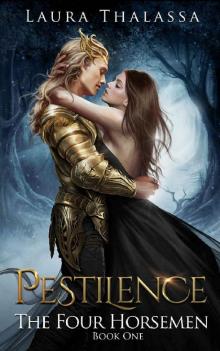 Pestilence (The Four Horsemen Book 1)
Pestilence (The Four Horsemen Book 1)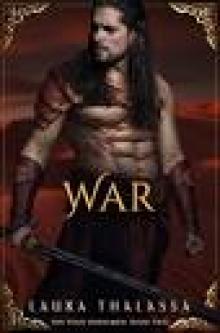 War (The Four Horsemen Book 2)
War (The Four Horsemen Book 2)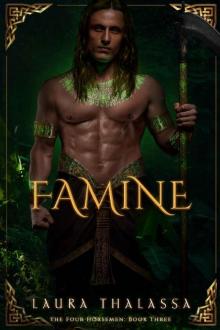 Famine (The Four Horsemen Book 3)
Famine (The Four Horsemen Book 3)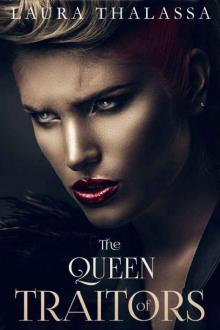 The Queen of Traitors (The Fallen World Book 2)
The Queen of Traitors (The Fallen World Book 2)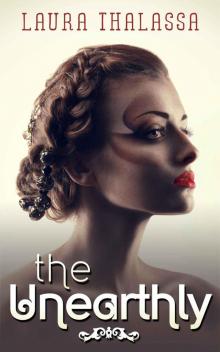 The Unearthly (The Unearthly Series)
The Unearthly (The Unearthly Series)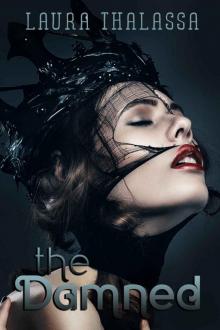 The Damned (The Unearthly Book 5)
The Damned (The Unearthly Book 5)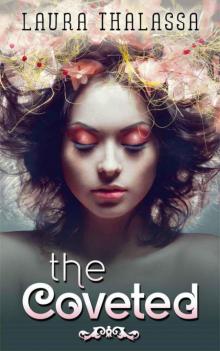 The Coveted (The Unearthly #2)
The Coveted (The Unearthly #2)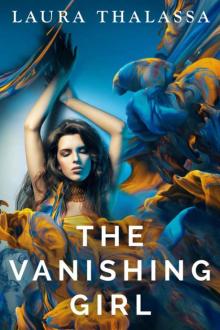 The Vanishing Girl
The Vanishing Girl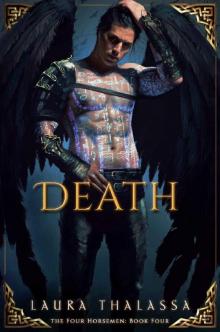 Death (The Four Horsemen Book 4)
Death (The Four Horsemen Book 4)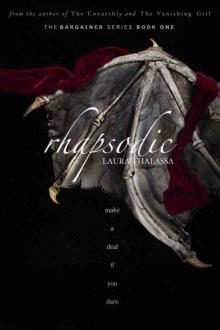 Rhapsodic (The Bargainer Book 1)
Rhapsodic (The Bargainer Book 1)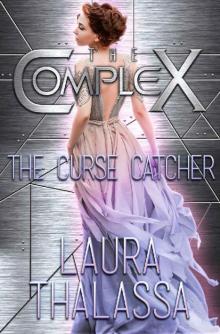 The Curse Catcher (The Complex Book 0)
The Curse Catcher (The Complex Book 0)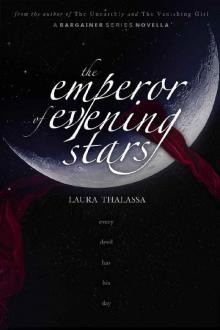 The Emperor of Evening Stars (The Bargainer Book 3)
The Emperor of Evening Stars (The Bargainer Book 3)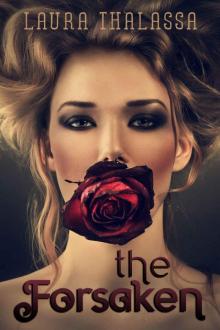 The Forsaken
The Forsaken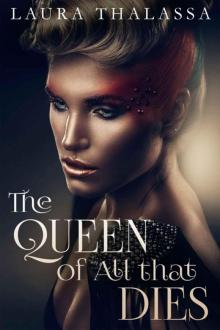 The Queen of All that Dies (The Fallen World Book 1)
The Queen of All that Dies (The Fallen World Book 1)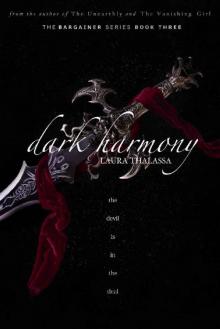 Dark Harmony (The Bargainer Book 3)
Dark Harmony (The Bargainer Book 3) Blood and Sin (The Infernari Book 1)
Blood and Sin (The Infernari Book 1)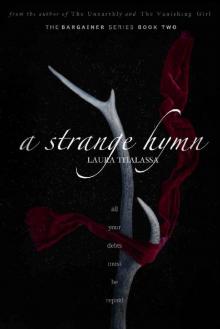 A Strange Hymn (The Bargainer Book 2)
A Strange Hymn (The Bargainer Book 2)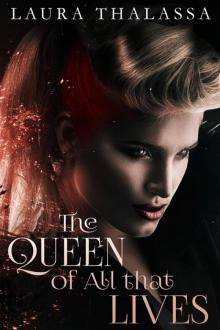 The Queen of All That Lives (The Fallen World Book 3)
The Queen of All That Lives (The Fallen World Book 3) The Cursed (The Unearthly)
The Cursed (The Unearthly)